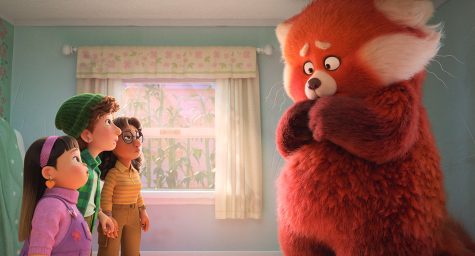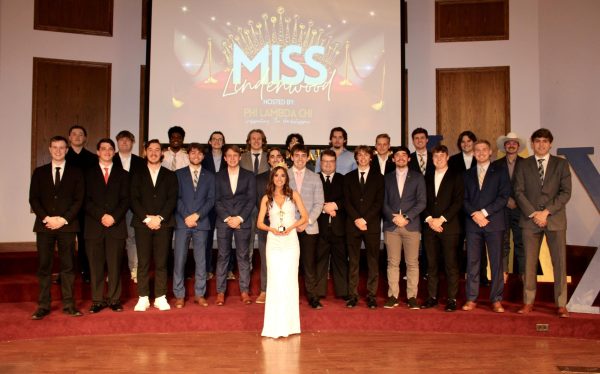Review: “Turning Red”: Pixar is growing up
April 7, 2022
Disney and Pixar have made over 20 films together. We’ve grown up with toys dealing with existentialism, rats wanting to be world-famous chefs, an old man flying his house with balloons, and monsters who turned scaring children into an energy-gathering business.
Now Disney has a new film out about a girl dealing with a topic that every parent wants to hear about: PUBERTY.
“Turning Red” is directed by Domee Shi. This is Shi’s first directed film, outside of a short called “Bao;” Shi also wrote for both films. “Bao” was about a Chinese-Canadian woman suffering from empty nest syndrome (grief parents go through when their children move out to live on their own). The mother gets a second chance at motherhood when one of her handmade dumplings comes alive. This part of parenthood can be seen in “Turning Red” by Mei’s mother who is dealing with her only child growing up.
Before directing, Shi worked as a storyboard artist for past Pixar films like “Toy Story 4,” Incredibles 2,” and “Inside Out.”
“Turning Red” introduces Rosalie Chiang in her first film lead as Mei Lee along with Sandra Oh (BBC’s “Killing Eve”) as Ming Lee, Ava Morse (“Ron’s Gone Wrong”) as Miriam, Maitreyi Ramakrishnan (Netflix’s “Never have I Ever”) as Priya, Orion Lee (“Only You”) as Jin Lee, Wai Ching Ho (Netflix’s “Defenders”) as Wu Lee, James Wong (“Big Trouble in Little China”) as Mr. Gao, and storyboard artist Hyein Park as Abby.
Meilin “Mei” Lee is your average 13-year-old Chinese-Canadian girl growing up in 2002. Her mother, Ming, is overprotective and overbearing with how Mei enjoys her time with her three best friends. Mei and her friends are obsessed with a boy band concert coming to town. Mei spends the rest of her time taking care of the family temple and studying for school. Just your average pre-teen girl.
Until one morning…
Mei wakes up as a giant red panda because of an ancestral curse. The curse carries on to every female in their family line, and she must seal the red panda spirit away during the next Red Moon to be free from it. Orrr… she can show off the red panda to everybody and party! Can a curse be so bad if it’s fun and everyone loves it? Well, everyone except Mei’s grandmother and aunts, who come to town to take it away.
So, if you know ‘80s movies, this may sound strangely familiar (yes, I’m old, shuddup). A 1985 teen comedy called “Teen Wolf” starring Michael J. Fox. In that film, Fox discovers he can turn into a werewolf naturally in his high school years from a family curse. Instead of hiding it like his parents, he decides to use his abilities for school popularity and an edge in basketball.
Anyways, there are a lot of similarities between the two films. Both main characters are teens in high school that discover a family curse that turns them into animal monsters. Both wind up revealing their transformation in school and use it for fame and popularity.
There was also a “Teen Wolf” sequel and a TV series on MTV but meeeh.
So, you might be piecing a few things together. This is a coming-of-age story, the girl is 13 years old, her emotions are changing (in more than one way), only females in her family can turn into red pandas uncontrollably from unstable emotions, the title is called “Turning Red,” and the red panda is red. Yup, the red panda is a metaphor for female puberty. Oh, fun topic, right?
So wait, this is a Disney/Pixar cartoon that isn’t about toys coming to life or lost fishes in the ocean? It’s talking about puberty; something that makes uptight parents uncomfortable to talk to their own kids about? “Bold move, Cotton…”
It’s actually a creative approach to symbolize Mei’s changes with the red panda. It doesn’t go in-depth with her natural biological changes. Her transformations start off as out-of-control and embarrassing, running straight home during school when she couldn’t contain it. As Mei begins to control her emotions, she starts accepting the red panda spirit as it becomes a part of her.
Shi made a strong push to include scenes referencing puberty, subtle or not, and she was expecting the studio executives to remove them, which did not happen. It feels like Shi put a lot of her own experiences growing up into this film, which may explain why it’s set in 2002.
Like “Encanto,” there isn’t a set villain for the film. How am I supposed to take a movie seriously without a villain fight showdown, Disney?
Sandra Oh plays Ming Lee, Mei’s mom, as the overbearing parent that has several layers to her character. She’s not an evil parent but she stands on an antagonistic ground for Mei. Ming Lee also has ‘Karen’ moments, the internet term for entitled (usually) women, especially when she’s sneaking around school grounds to monitor her daughter. Her overprotective actions also come at embarrassing and cringy moments for Mei, which doesn’t help her red panda transformations.
Despite that, there’s a very touching moment in the end when Mei and Ming confront each other and address Mei growing up. You see Ming’s struggle to want to maintain the relationship she and her daughter had. Again, she’s not evil, she’s just making the wrong choices to keep things the way they were.
“Turning Red” is a decent, inventive way to show a young girl growing up and dealing with a crazy development. Even if you didn’t grow up with puberty as a girl, you can still appreciate the awkwardness and embarrassing moments that Mei goes through. Adults can also appreciate Ming seeing her child growing up and becoming her own self.
What’s actually crazy is parents’ responses to a Disney/Pixar film using puberty as a theme. Bambi’s mom dying, the crazy woman wanting to skin Dalmatians for a coat, and the bad guy in “Tarzan” dying from hanging are all okay to have in cartoons but a girl growing up is apparently off-limits. I saw one review from a Christian site that gave “Turning Red” a bad review. They didn’t like it because Mei chose to embrace the panda instead of praying and giving herself and her condition to Jesus, even though Mei isn’t Christian. I mean, faith is one thing, but demanding it from characters with strong Chinese backgrounds that honor their ancestors in temples is another thing.
Hey, wouldn’t you know it? There’s an end-credit scene at the end, with a fun little joke with Mei’s dad.
“Turning Red” is streaming on Disney Plus.

















